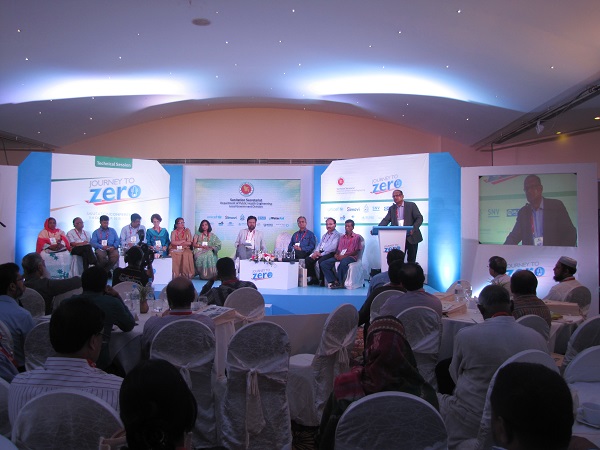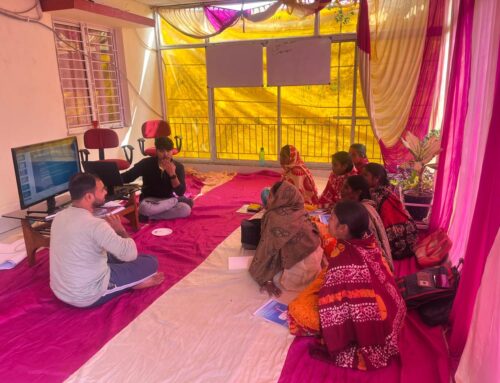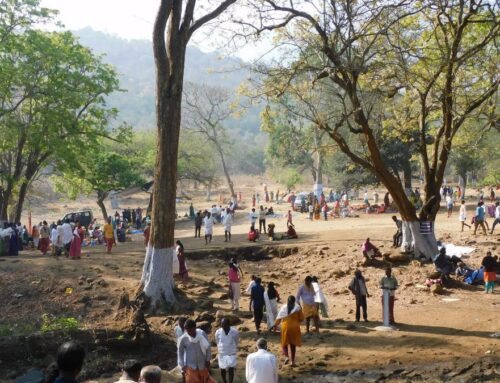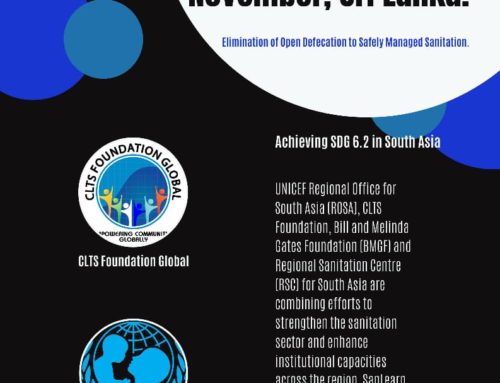
The Sanitation Secretariat, Department of Public Health Engineering, Local Government Division along with a host of other institutions organised the “Journey To Zero” conference in Dhaka Bangladesh. These organisations were namely, WaterAid, Plan International, Practical Action, WSSCC, SNV, Simavi, BAWIN, FANSA Bangladesh, NGO Forum for Public Health, WASH Alliance, End Water Poverty and UNICEF among others. Dr. Kamal Kar presented an inspirational speech at the first Technical Session at this grand conference.
In his speech Dr. Kar presented his gratitude to be present at the historic event. He said that he felt extremely honoured to be presenting a speech on such a significant- landmark of an occasion. He proclaimed that this event in the history of Bangladesh will be remembered for generations as the event that changed the lives of millions of people in this world.
Dr. Kar briefly traced the history of the mammoth transformations and discoveries that have shaped the world that we live in. He cited examples of innovations and discoveries that changed the way we lead life in our world. He spoke about Dr. John Snow, who in 1854 pioneered the Germ Theory in his lab in Soho on Broad Street in London. This theory challenged the then dominant Miasma Theory which claimed that people died of Cholera due to exposure to obnoxious air-pollution. Dr. Snow proved through his works that the disease was indeed spread through contaminated water and not through air. This event led to emphasis on sanitation. Similarly Dr. Louis Pasteur worked in his lab in France at the University of Lille and discovered the theory of Pasteurisation in 1862 and the chicken cholera vaccine in 1879. He also gave the world vaccines for Rabies and Anthrax. Finally Dr. Alexander Fleming, a Scottish gentleman in 1928 in his lab at St. Mary’s hospital in London, discovered Penicillin and saved millions of lives. These experiments and discoveries have had a revolutionary impact for the betterment of humanity. These laboratories, said Dr. Kar, became the birthplace of life altering discoveries. In this context he spoke of another grand laboratory. In the year 2000, there was a lab where a crucial experiment was successfully carried on. The name of this lab was Mosmoil in Rajshahi district of Bangladesh. WaterAid and VERC were onboard and together, said Dr. Kar, a transformative journey was carried on in an experiment, which was spread across almost all other parts of Bangladesh over the years. It was realised that local empowerment and collective behaviour change was the answer to totally eliminate Open Defecation. The solution lay within each individual in the form of behaviour change, not through outside subscription of subsidised household toilet acquisition.

Dr. Kar exclaimed that both the journey and its pace have been stunning. Just within 10-12 years Bangladesh has stunned the world. People across the globe are following the discovery of Mosmoil and emulating Bangladesh. Twenty-five nations are following CLTS in their national policy. Today we are envisioning an ODF world as we move from MDGs to SDGs, which is a jewel in the crown of Bangladesh. The story of empowering local communities through their own visual analysis where they realise the fact that it is not a private good-the acquisition of a toilet by subsidies, but a question of public good where nobody defecates in the open led by collective local decisions and actions.
In the next 2-3 decades when the world will be ODF, global communities across the world will declare themselves ODF by abstaining to defecate in the open, Bangladesh will be remembered fondly as a pioneer. Dr. Kar said that it was a great pleasure for him to see champions of this cause, who have made this ODF aim achievable, being present as panelists’ at the conference. In his speech he explained how Bangladesh has culturally and historically been a significant land and how this nation has also given the world a gift of collective behaviour change which leads mankind to lead a life of dignity. Dr. Kar said that the solution lay somewhere around thinking beyond politics. One has to think beyond local & regional barriers. The message of humanity based on self-respect, social solidarity, decentralisation and local empowerment could be spread to the developing world where Bangladesh could be the flagship nation to lead this global movement.
The CLTS Approach has now been spread to over 64 countries in Asia, Africa and Latin America. Over 40 million people live in ODF conditions now thanks to the approach. Africa and Madagascar in particular has made monumental progress towards achieving an ODF nation. In this context, Dr. Kar said that the success of CLTS would depend on creating champions not just at the community but also regional and national levels. To replicate these successes prominent personalities like the Prime Ministers and Presidents of nations need to become champions of CLTS.
Dr. Kar in his inspirational speech also highlighted certain sanitation challenges that nations are currently facing. These include the scaling up of ODF communities up the sanitation ladder. Introduction of low-cost and durable toilets rather than high external-input dependant technology for superstructures and substructures materials involving communities as equal partners of research is a crucial concern. This also requires escalated involvement of Natural Leaders and Community Consultants in quality scaling up. Prevention of slippage toward sustainability of sanitation usage is another challenge that needs to be addressed. Most importantly, inter-ministerial and inter-institutional coordination as a challenge needs to be addressed as a priority.
Speaking about the tasks ahead of us, Dr. Kar said that, we need to emulate the learnings of Bangladesh in other nations and liberate more countries from the shackles of disease and poverty. He said that we need to decide our role in SACOSAN VI and showcase champions of CLTS and we need to start creating a platform to discuss success factors of Bangladesh working with national and international leaders to achieve MDG 7.






Leave A Comment